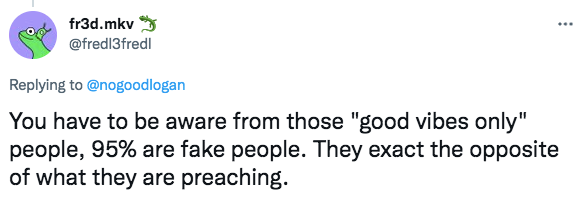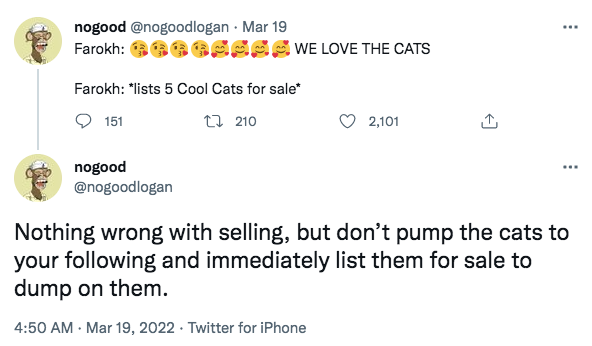This is the narrative pushed by blue ticked influencers across Twitter, including big names like Farokh and Gary Vee. There’s a darker truth behind the gms, though. Toxic positivity is poisoning the NFT space, depriving people of their funds, helping scammers run rife and seriously harming mental health.

#7 Encourages hard work over efficient work
Unpopular opinion: hard work is not enough. Spending all day on Twitter won’t make you rich. Staying up all night won’t get you that lambo. The old adage of “work smart, not hard” has been completely lost in the sea of positivity. Putting in the hours - or “showing up” as it’s routinely called - is completely useless if you’re ploughing those hours into the wrong kind of work. This is even more acute in the relatively new NFT space, where there’s no set roadmap toward success. Working a few hours per day on something effective is better than a protracted sixteen-hour graft in the wrong direction. Influencers glorify relentless toil without sleep, even though most of those big accounts are likely run by teams.
#6 Protects dodgy projects

The term FUD is common in the NFT space (it means fear, uncertainty and doubt). It’s the antithesis of positivity and tends to be used pejoratively to write off anybody who expresses doubt about a project, NFT or person. This was never more apparent than when the Squiggles collection was flagged as being a potential rug. Despite a pretty comprehensive dossier doxing the team for previous scams and a dramatic delisting from OpenSea, Twitter users rallied behind the project, citing exonerating evidence including belief, positive vibes and hope. Any criticism was written off by the team as FUD and negative vibes. This kind of mindset makes people easy pickings for scammers.
#5 It causes burnout
The idea at the heart of toxicpositivity is simple; if you work hard enough (or for 10 years straight without a break - thanks Gary Vee), you will succeed. WAGMI. When (for a whole host of reasons) things don’t go as planned the individual is left wondering what they personally did wrong, harming their self-esteem. This leads to feelings of anxiety and even depression. Others will continue to graft, ploughing hours upon hours into their work, sacrificing sleep, diet, friends and family. This, of course, causes burnout. Toxic positivity leads to a cycle of boom and bust with periods of high productivity followed by periods of deep stress and burnout.
#4 Encourages extremes
Toxic positivity, almost by definition, is blinkered. Bitcoin maximalists have nothing good to say about ETH. XTZ purists frown on both. Devotees are so utterly positive about their chosen infrastructure that they exclude outside voices. Extreme thinking means an echo chamber, which shuts down the idea that anything can be learned from anyone else. It also encourages the tribal nature that’s starting to develop between different NFT communities. Since one community is perfect, it necessarily follows that the others aren't. Growth only happens via cooperation and exploring ideas that might seem alien or outright opposed to the current way of doing things. Toxic positivity takes this out of the equation.
#3 Glorifies degens

Degen has become a term of endearment despite the life-altering risk associated with dropping huge amounts of cash on poorly researched, highly-likely-to-fail projects. Some degens hit lucky, but many, many more, lose everything: you only hear about the success stories. Worse, those success stories push the toxic positivity narrative, tempting more people to dump huge sums into unresearched projects. Never argue with a degen, either. Suggest that the project's Twitter is full of bots or that the unknown team is value sniping and you’ll just be accused of FUD. Vibes, positivity, gms and wagmis aren’t a substitute for due diligence, no matter what the degens say.
#2 Trivialises massive losses
It’s a fact of life - not everything works out, especially investments. NFTs and crypto are fraught with risk, but this is something that the positivity crowd simply won’t talk about. Just lost a fortune? It doesn’t matter, keep investing, keep trying - you’ll get there eventually. Not only does this encourage newer crypto enthusiasts to overstretch themselves but it papers over the mental harm associated with a loss. If somebody is down a significant sum they’re likely feeling depressed and anxious, as though they’ve failed. The last thing they need is a GM/WAGMI combo to trivialise their feelings.
#1 Gives influencers too much power

NFT influencers with big followings drive the toxic positivity narrative relentlessly; with good reason. It inflates their follower counts. This, of course, puts all the power in the hands of the influencers, allowing them to hype projects at will. Case in point: Farokh. One of the most relentlessly positive influencers out there, Farokh is always happy, and never more so than when he’s pumping the latest project only to dump it later. This isn’t an isolated incident. Positivity has been weaponised by influencers across Twitter and that’s dangerous.
Read more:
Top-10 NFT Influencers of 2021
Was a Serial Rugging Gang Just Caught in The Act?
Zuckerberg’s WAGMI Chant is NGMI


